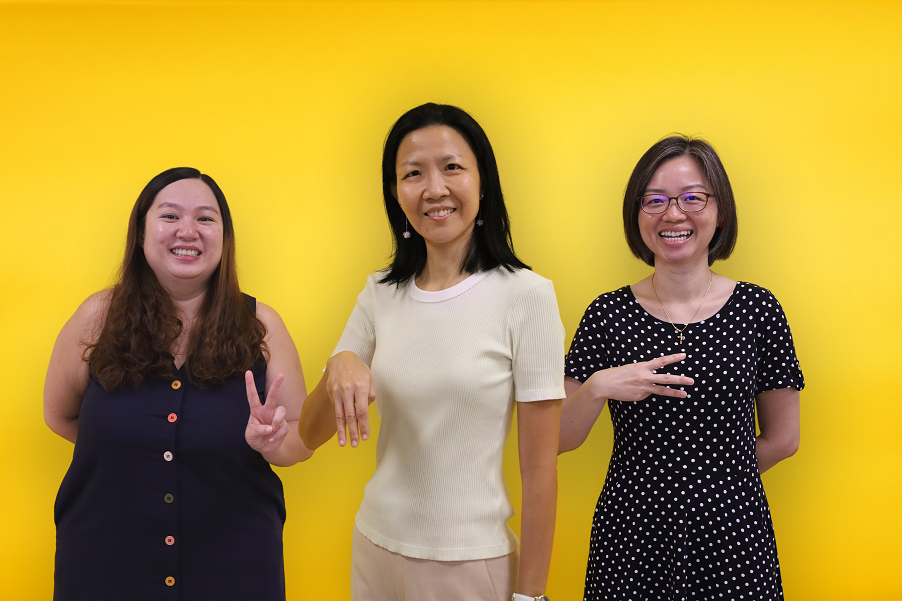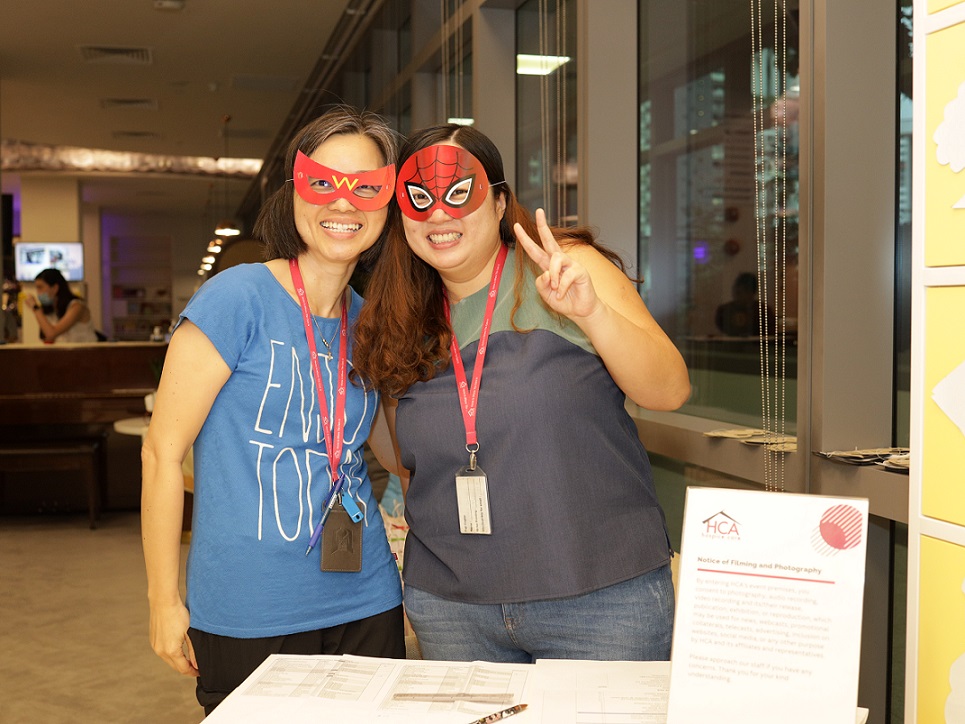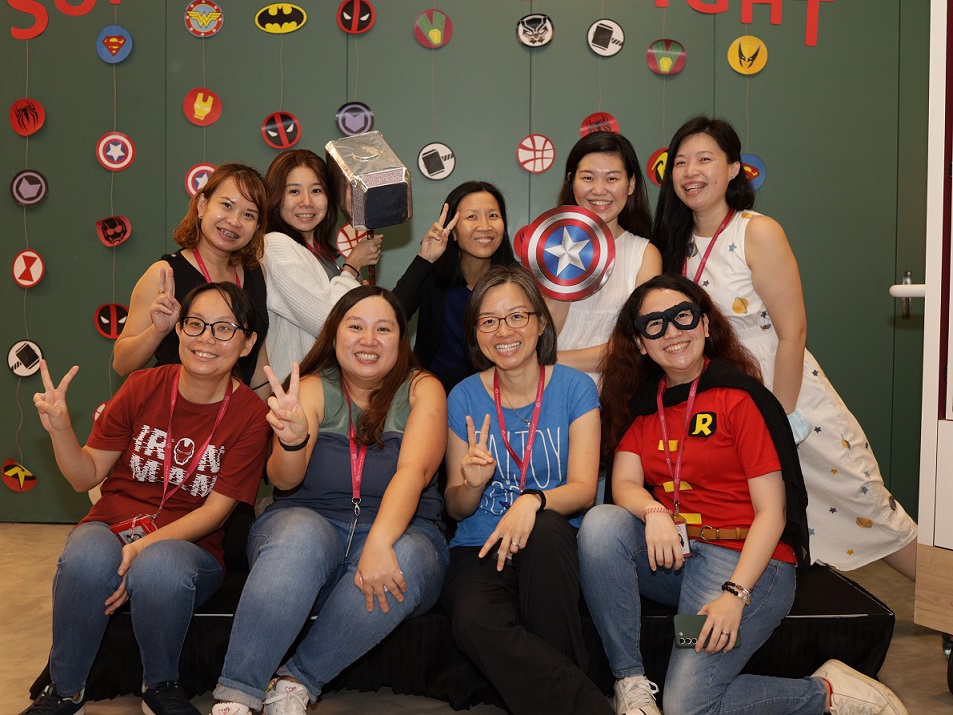
Close


Volunteers have a special place in the history of HCA – back in the 1980s, it was the collective efforts of volunteer nurses, doctors and social workers that set the foundation of Singapore’s largest home hospice provider.
Today, our volunteers remain a key driving force in all aspects of HCA’s operations, lending their support in different ways. From patient-facing roles like Vigil Angels, Medi-Minders, befrienders and medical escorts, to back-end efforts, such as letter shopping and event organisation, our volunteers have continually risen to the challenge.
Each day, our volunteers attend to their assignments like clockwork – an efficient and seamless experience that would not have been possible without the efforts of HCA’s Volunteer Management & Engagement (VME) team.
In celebration of International Volunteer Managers Day, which falls on 5 November, let’s meet the members of the VME team!
The Facilitator
As head of the VME department, Lynn Goh oversees her team and the projects they are handling. “A typical day involves lots of problem-solving and discussion with my teammates on matters pertaining to volunteer management, as well as addressing issues and concerns faced by the team in our daily work,” she explains.
Having worked with numerous volunteers in different sectors, Lynn was keen to explore a role in the hospice care setting, to support volunteers in serving patients at the end of life.
One of the VME team’s greatest challenges lies in aligning the volunteer experience with organisational needs. “It is important to strike a balance between curating opportunities that provide a good experience for volunteers (so that they will continue to volunteer with HCA) and meeting the constantly changing needs on the ground (so that real needs are met),” she says.
“Ultimately, I hope that we will be able to build a competent and committed volunteer workforce that is capable of delivering high-quality service to our patients, eventually integrating volunteers into HCA effectively to achieve our mission,” Lynn explains.
The Matchmaker
For Senior Executive Tan Zhenxiu, her passion for volunteering began in her university days. “I was volunteering regularly during my university days as a member of the NUS Community Service Club. When I tried to apply to be in the organising committees for different projects, I realised I didn’t have a particular skill that I was good at,” she shares. “I ended up finding interest in volunteer management as I enjoyed interacting with like-minded people with the same interest of volunteering.”
It was a stroke of serendipity that brought Zhen Xiu to the sector. Shortly after she graduated, she learned that the organisation her friend was working at was hiring, and soon landed her first job in volunteer management.

“From there, there was no looking back. This is a role that allows me to interact with beneficiaries, and it is very fulfilling to see the smiles of beneficiaries and their families,” Zhen Xiu shares. “Understanding their needs and matching them to how volunteers wish to help, gives me job satisfaction and affirmation that I am doing good!”
Each day, Zhen Xiu is kept busy engaging with volunteers, managing volunteer application signups and handling volunteer requests from her colleagues.
“In the late morning, I usually try to catch my clinical colleagues, either physically or virtually, after the daily roll call ends, to clarify and follow up on job requests,” she says. “I would usually spend the rest of the day talking to volunteers, to match them to various job requests they have signed up for.”
Like fitting the pieces of a jigsaw puzzle together, matching volunteers to job requests requires great perspicacity. “One of the greatest challenges is creating a mutual understanding between the patients and families, our colleagues and the volunteers,” Zhen Xiu explains. “Each person may view a single matter differently from another.”

She cites an example of a housekeeping request. “Before putting the request across to volunteers, I need to find out what kind of housing the patient is staying in (the size of the house will determine how many volunteers we will need), the state of the current cleanliness (or dirtiness) of the house, whether the patient has cleaning equipment and agents (sometimes, if they don’t clean, they may not have these at home), whether the patient has hoarding mentality (if so, will the Medical Social Worker need to be present to manage?),” she shares. “I would also need to justify to volunteers why some patients, who have families of their own, are unable to get their family members to support and need volunteers’ help instead.”
“Therefore, there is a lot of time spent gathering information to do powerful storytelling – and this is even before coordinating and matching volunteers to a single job – which many people do not see.”
The Mediator
HCA Senior Executive Frances Ng may be the newest member of the VME team, but she brings onboard a wealth of personal and professional experience. “I love working with people and have been involved in volunteer management since 2011,” she says. “In 2018, I experienced first-hand what dignified palliative care feels like when my father-in-law was given a prognosis of weeks to months, and was admitted to an inpatient hospice service.”
“During the two weeks he was there, the staff and volunteers came together to provide physical, social and spiritual comfort and care for my father-in-law, husband and me.”
Frances vividly recalls a fateful night when her father-in-law called her from the hospice. “In his state of confusion, he told me, ‘I am at home.’,” she shares. “That incident provided a lot of comfort for my husband and I, as we realised he was feeling very safe and at ease in the hospice.”
“That experience ignited my wish to work in a palliative setting. When the opportunity arose last year, I jumped at it.”
At present, the VME team is undergoing restructuring to optimise its operations for the future needs of HCA. “Apart from learning about the current Volunteer Management System (VMS), processes and challenges from my teammates, I am also involved in brainstorming and formulating new processes, especially in the area of volunteer engagement and retention,” Frances explains.

“To be effective in my role, I also spend time getting to know our new and current volunteers, as well as colleagues from various departments and centres.”
Creating positive change is never easy, but Frances is committed to facilitating a meaningful experience for all volunteers. “Change is always difficult, even more so when I am still trying to get to know and build trust with the various stakeholders involved,” she says.
“I hope that in the future, we will have more volunteers from all walks of life meaningfully engaged and developed, to extend the work of HCA through their gift of time and talents,” Frances shares. “I also hope that all of our colleagues will be equipped with the relevant skills to create an organisation-wide positive and meaningful culture and experience with all our volunteers.”